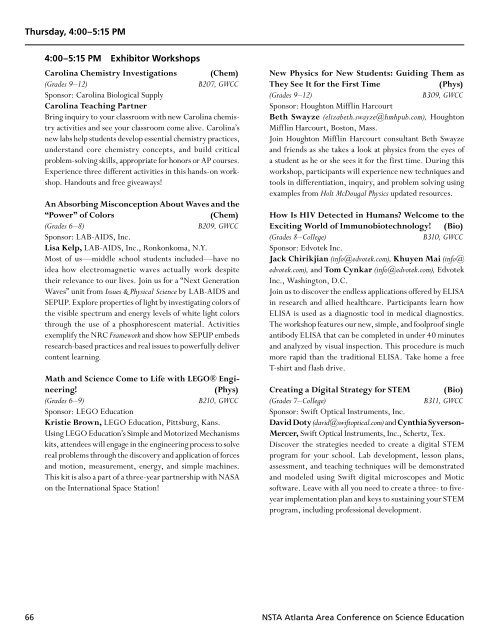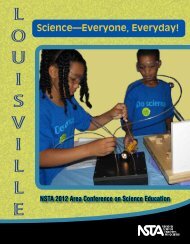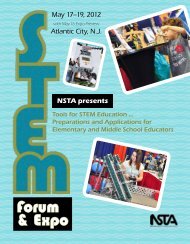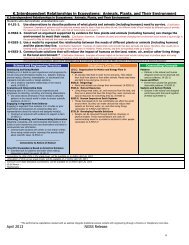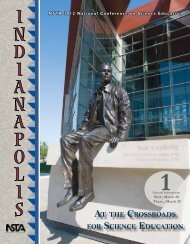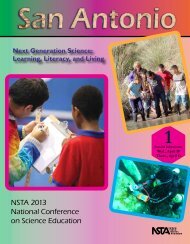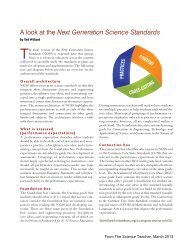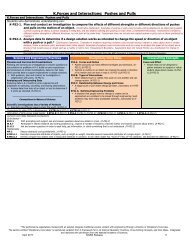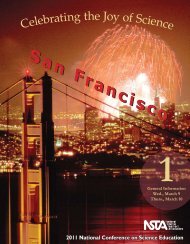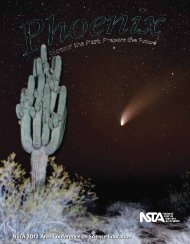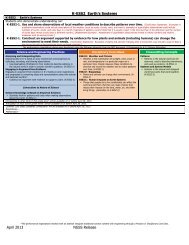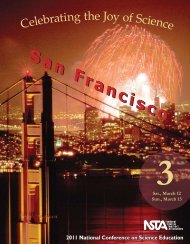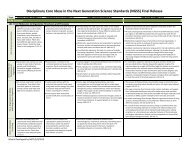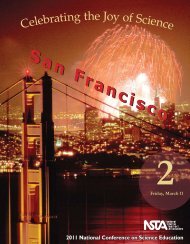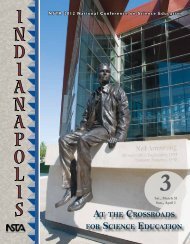Atlanta Conference Program
Atlanta Conference Program
Atlanta Conference Program
You also want an ePaper? Increase the reach of your titles
YUMPU automatically turns print PDFs into web optimized ePapers that Google loves.
Thursday, 4:00–5:15 PM<br />
4:00–5:15 PM Exhibitor Workshops<br />
Carolina Chemistry Investigations (Chem)<br />
(Grades 9–12)<br />
B207, GWCC<br />
Sponsor: Carolina Biological Supply<br />
Carolina Teaching Partner<br />
Bring inquiry to your classroom with new Carolina chemistry<br />
activities and see your classroom come alive. Carolina’s<br />
new labs help students develop essential chemistry practices,<br />
understand core chemistry concepts, and build critical<br />
problem-solving skills, appropriate for honors or AP courses.<br />
Experience three different activities in this hands-on workshop.<br />
Handouts and free giveaways!<br />
An Absorbing Misconception About Waves and the<br />
“Power” of Colors<br />
(Chem)<br />
(Grades 6–8)<br />
B209, GWCC<br />
Sponsor: LAB-AIDS, Inc.<br />
Lisa Kelp, LAB-AIDS, Inc., Ronkonkoma, N.Y.<br />
Most of us—middle school students included—have no<br />
idea how electromagnetic waves actually work despite<br />
their relevance to our lives. Join us for a “Next Generation<br />
Waves” unit from Issues & Physical Science by LAB-AIDS and<br />
SEPUP. Explore properties of light by investigating colors of<br />
the visible spectrum and energy levels of white light colors<br />
through the use of a phosphorescent material. Activities<br />
exemplify the NRC Framework and show how SEPUP embeds<br />
research-based practices and real issues to powerfully deliver<br />
content learning.<br />
Math and Science Come to Life with LEGO® Engineering!<br />
(Phys)<br />
(Grades 6–9)<br />
B210, GWCC<br />
Sponsor: LEGO Education<br />
Kristie Brown, LEGO Education, Pittsburg, Kans.<br />
Using LEGO Education’s Simple and Motorized Mechanisms<br />
kits, attendees will engage in the engineering process to solve<br />
real problems through the discovery and application of forces<br />
and motion, measurement, energy, and simple machines.<br />
This kit is also a part of a three-year partnership with NASA<br />
on the International Space Station!<br />
New Physics for New Students: Guiding Them as<br />
They See It for the First Time<br />
(Phys)<br />
(Grades 9–12)<br />
B309, GWCC<br />
Sponsor: Houghton Mifflin Harcourt<br />
Beth Swayze (elizabeth.swayze@hmhpub.com), Houghton<br />
Mifflin Harcourt, Boston, Mass.<br />
Join Houghton Mifflin Harcourt consultant Beth Swayze<br />
and friends as she takes a look at physics from the eyes of<br />
a student as he or she sees it for the first time. During this<br />
workshop, participants will experience new techniques and<br />
tools in differentiation, inquiry, and problem solving using<br />
examples from Holt McDougal Physics updated resources.<br />
How Is HIV Detected in Humans Welcome to the<br />
Exciting World of Immunobiotechnology! (Bio)<br />
(Grades 8–College)<br />
B310, GWCC<br />
Sponsor: Edvotek Inc.<br />
Jack Chirikjian (info@edvotek.com), Khuyen Mai (info@<br />
edvotek.com), and Tom Cynkar (info@edvotek.com), Edvotek<br />
Inc., Washington, D.C.<br />
Join us to discover the endless applications offered by ELISA<br />
in research and allied healthcare. Participants learn how<br />
ELISA is used as a diagnostic tool in medical diagnostics.<br />
The workshop features our new, simple, and foolproof single<br />
antibody ELISA that can be completed in under 40 minutes<br />
and analyzed by visual inspection. This procedure is much<br />
more rapid than the traditional ELISA. Take home a free<br />
T-shirt and flash drive.<br />
Creating a Digital Strategy for STEM (Bio)<br />
(Grades 7–College)<br />
B311, GWCC<br />
Sponsor: Swift Optical Instruments, Inc.<br />
David Doty (david@swiftoptical.com) and Cynthia Syverson-<br />
Mercer, Swift Optical Instruments, Inc., Schertz, Tex.<br />
Discover the strategies needed to create a digital STEM<br />
program for your school. Lab development, lesson plans,<br />
assessment, and teaching techniques will be demonstrated<br />
and modeled using Swift digital microscopes and Motic<br />
software. Leave with all you need to create a three- to fiveyear<br />
implementation plan and keys to sustaining your STEM<br />
program, including professional development.<br />
66 NSTA <strong>Atlanta</strong> Area <strong>Conference</strong> on Science Education


